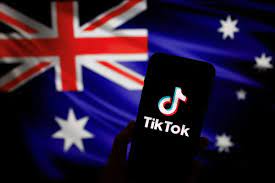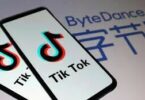SYDNEY (AFP): Australia said Tuesday it will ban TikTok on government devices, joining a growing list of Western nations cracking down on the Chinese-owned app due to national security fears.
Attorney-General Mark Dreyfus said the decision followed advice from the country’s intelligence agencies and would begin “as soon as practicable”.
Australia is the last member of the secretive Five Eyes security alliance to pursue a government TikTok ban, joining its allies the United States, Britain, Canada and New Zealand.
France, the Netherlands and the European Commission have made similar moves.
Dreyfus said the government would approve some exemptions on a “case-by-case basis” with “appropriate security mitigations in place”.
Cyber security experts have warned that the app — which boasts more than one billion global users — could be used to hoover up data that is then shared with the Chinese government.
Surveys have estimated that as many as seven million Australians use the app — or about a quarter of the population.
In a security notice outlining the ban, the Attorney-General’s department said TikTok posed “significant security and privacy risks” stemming from the “extensive collection of user data”.
Fergus Ryan, an analyst with the Australian Strategic Policy Institute, said stripping TikTok from government devices was a “no-brainer”.
“It’s been clear for years that TikTok user data is accessible in China,” Ryan told AFP.
“Banning the use of the app on government phones is a prudent decision given this fact.”
Ryan said Beijing would likely “perceive it as unfair treatment of and discrimination against a Chinese company”.
The security concerns are underpinned by a 2017 Chinese law that requires local firms to hand over personal data to the state if it is relevant to national security.
Beijing has denied these reforms pose a threat to ordinary users.
China “has never and will not require companies or individuals to collect or provide data located in a foreign country, in a way that violates local law”, foreign ministry spokesperson Mao Ning said in March.
– ‘Rooted in xenophobia’ –
TikTok has said such bans are “rooted in xenophobia”, while insisting that it is not owned or operated by the Chinese government.
The company’s Australian spokesman Lee Hunter said it would “never” give data to the Chinese government.
“No one is working harder to make sure this would never be a possibility,” he told Australia’s Channel Seven.
But the firm acknowledged in November that some employees in China could access European user data, and in December it said employees had used the data to spy on journalists.
The app is used to share short, lighthearted videos and has exploded in popularity in recent years.
Many government departments were initially eager to use TikTok as a way to connect with a younger demographic that is harder to reach through traditional media channels.
New Zealand banned TikTok from government devices in March, saying the risks were “not acceptable in the current New Zealand Parliamentary environment”.
Earlier this year, the Australian government announced it would be stripping Chinese-made CCTV cameras from politicians’ offices due to security concerns.
Australia pauses interest rate hikes
Australia’s central bank left interest rates on hold Tuesday, pausing a series of sharp hikes that have drawn criticism from homeowners.
The Reserve Bank of Australia held borrowing costs at 3.6 percent, ending a run of 10 successive rate hikes aimed at taming inflation.
Governor Philip Lowe said the pause would allow the bank to take stock of previous increases and a global outlook that remains “subdued”.
“The recent banking system problems in the United States and Switzerland have resulted in volatility in financial markets and a reassessment of the outlook for global interest rates,” Lowe said.
The news gave a boost to stocks, with the S&P/ASX 200 rising 0.2 percent in the afternoon.
The RBA has come under fire from homeowners who have seen average monthly mortgage repayments skyrocket.
Australians are forking out an extra Aus$250 (US$169) every week to meet the repayments on an average mortgage of about Aus$600,000 (US$407,000).
Household inflation in Australia currently sits around 6.8 percent — down from 7.8 percent in December but still stubbornly above the central bank’s target of between two and three percent.
Lowe said “some further tightening of monetary policy may well be needed to ensure that inflation returns to target”.
Australia, like most countries fighting inflation, faces a delicate balancing act to bring prices down without stifling economic growth and sparking a recession.
“The path to achieving a soft landing remains a narrow one,” said Lowe.
House prices have fallen in most of Australia’s city centres since the Reserve Bank started lifting rates.
Market research firm Roy Morgan earlier this year estimated that one in five Australian households were facing “mortgage stress” and struggling to meet repayments.







